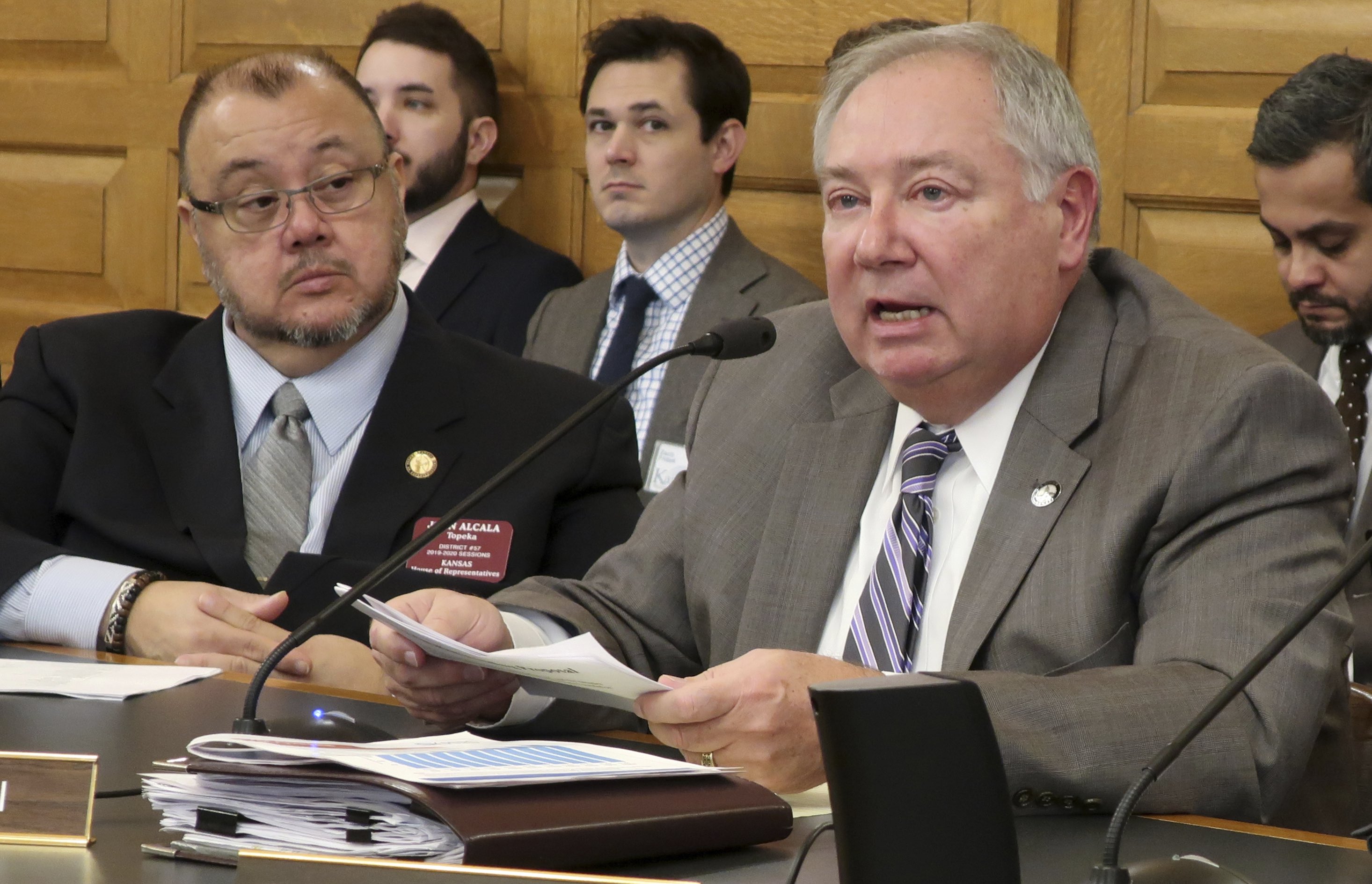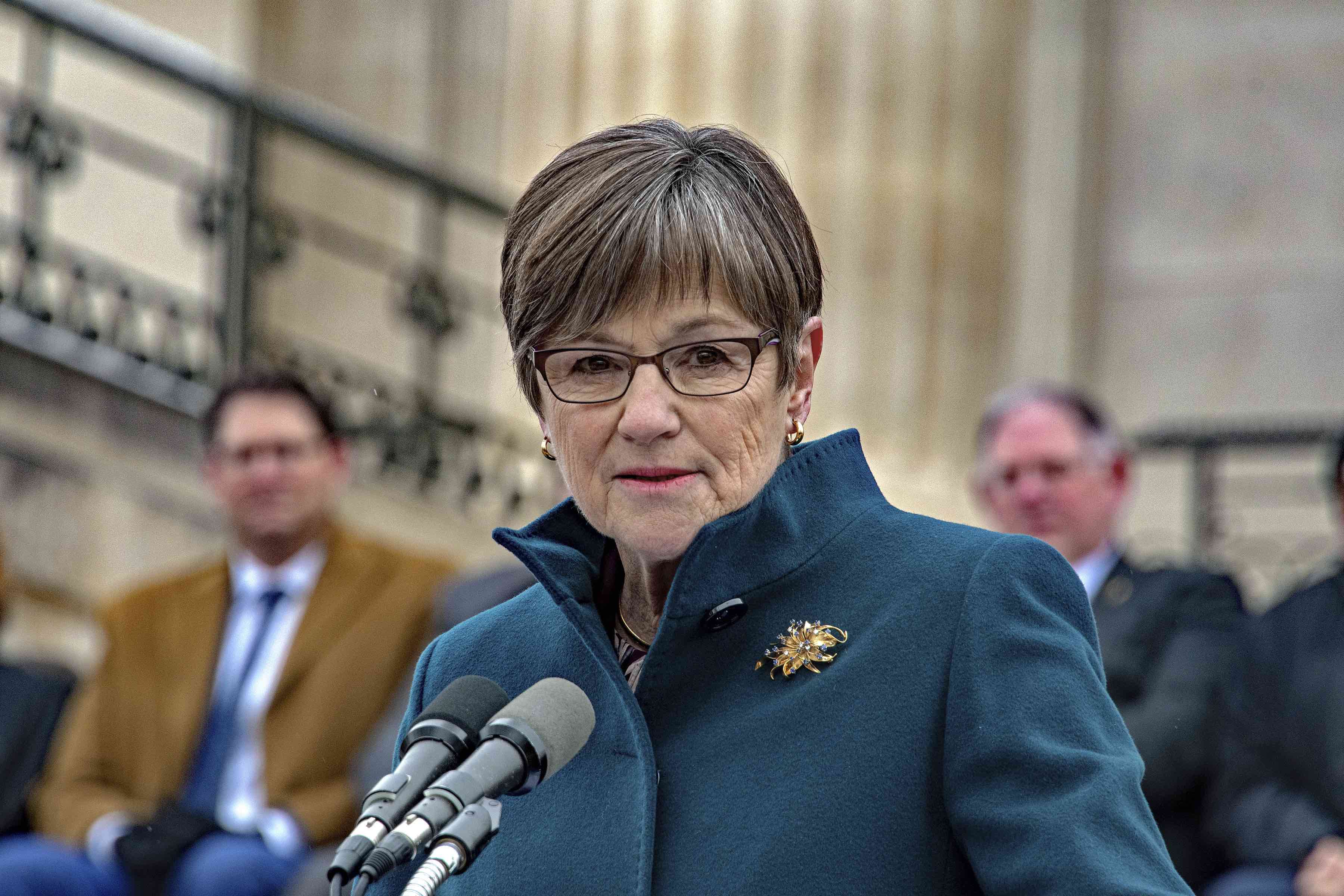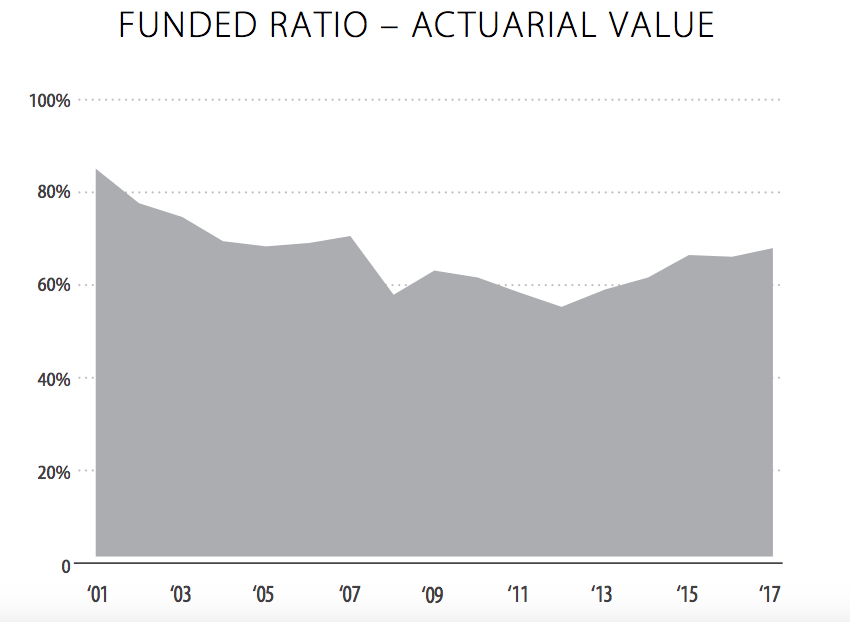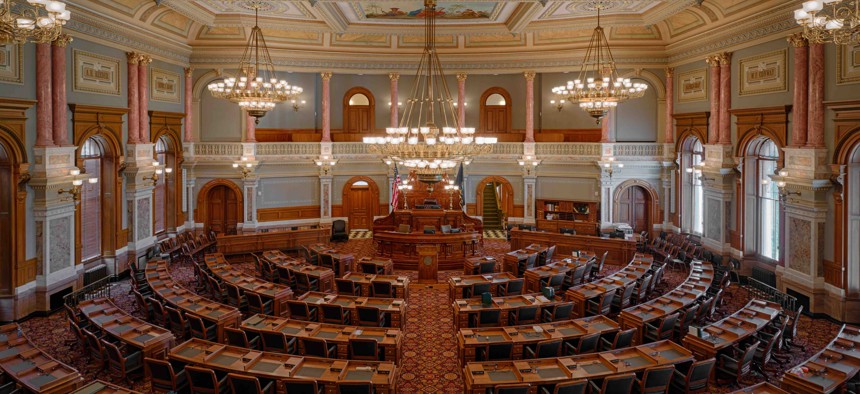Connecting state and local government leaders
Kansas Gov. Laura Kelly included the “reamortization” plan in her first budget. It’s proving to be controversial.
In the state budget plan she unveiled last week, Laura Kelly, the new governor of Kansas, calls for extending a timeline to pay down about $6.6 billion in public employee pension fund debt.
The financial maneuver promises to free up an estimated $160 million in the upcoming fiscal year, money that could be used to help Kelly, a Democrat, achieve her other priorities—like beefing up public school funding, expanding Medicaid and raising pay for state employees.
But there’s a catch. The “reamortization” plan would also increase by $7.4 billion—at least according to one estimate—the amount the state would have to pay over the next three decades to snuff out the unfunded pension liabilities the plan would affect.
“Like the classic refinancing the mortgage on your own house, you lower payments, but of course you’re paying longer,” Alan Conroy, executive director of the Kansas Public Employees Retirement System, or KPERS, said by phone last week.
“The flow of money into the system, in the short term, would certainly decrease,” he added.
That means fewer dollars in nearer years for the fund to invest and earn returns from. It also means that the pension system would be exposed longer to inherent investing risks, like recessions and market volatility, as it seeks to pay down its unfunded liabilities.
Kansas is not alone in managing an underfunded pension system, and it’s by no means the worst off state in this respect.
But the proposal from Kelly, who was elected in November, is a reminder of how underlying pension policies, like amortization schedules, can significantly alter long-term government costs, even potentially shifting them between generations.
Moody’s Investors Service doesn’t comment on budget proposals. But Matt Butler, a vice president with the ratings agency and the firm’s lead analyst for the state of Kansas, said last week that when it comes to pension reamortization, “we typically view it negatively.”
“It’s difficult to say whether or not it, and of itself, would cause us to make a rating change,” he added. “But, for the most part, it indicates a government looking to have near-term savings at the risk of cost growing more rapidly out into the future.”
Analysts with S&P Global Ratings offered a similar take. “The main concern is you’re funding less annually than you were before,” said David Hitchcock, a senior director in S&P’s U.S. public finance division. His colleague Ladunni Okolo, who tracks Kansas for S&P, added that pension reamortization is generally seen as a “cost deferral.”
‘Prudent’ or ‘Kicking the Can’?
Kelly’s budget itself acknowledges that reamortizing the pension debt “could require the state to pay more over the long run” and would delay getting it to a healthier funding level.
In a hearing last week, Larry Campbell, the governor’s budget director, told lawmakers the pension refinancing plan is “prudent” and would make paying down the debt “more manageable.” The proposal does not involve making any cuts to retiree benefits.
“Under the current strategy, payments will continue to grow and grow, causing agencies to make tough decisions often having negative impact to personnel and service delivery,” Campbell said.
But Republicans, who control both chambers of the Kansas Legislature, are scoffing at the idea of reamortization. The Kansas City Star reported that Senate Majority Leader Jim Denning said that in his “wildest dreams” he could not imagine lawmakers enacting the plan.
“I can’t see the Legislature going down that path,” he added, according to the newspaper.

Sen. Carolyn McGinn, who chairs the Senate budget committee, and Senate President Susan Wagle have signed onto a statement criticizing the plan, according to other local news reports.
The state’s elected Treasurer, Jake LaTurner, a Republican who sits on the KPERS board of trustees, and who is vying for seat in the U.S. Senate, called Kelly’s proposal “irresponsible.”
“We cannot keep kicking the can down the road and asking our children and grandchildren to foot the bill,” he said in a statement.
Kansas in recent years dealt with budget shortfalls, which were widely blamed on tax cuts first enacted in 2012 and championed by former GOP governor Sam Brownback. Lawmakers overrode Brownback’s veto and reversed the cuts in 2017, helping to boost tax revenue.
At the same time, policymakers there are looking to comply with a state Supreme Court decision from last year in a long-running case over public school spending. The court ruled that the state must spend more money on schools in order to comply with a school funding “adequacy requirement” in the state constitution.
Aiming to remedy the situation, Kelly in her budget calls for a $497.6 million increase in certain school aid over four years, above amounts the Legislature has approved previously.
"Throughout the decades, Kansas has made promises and then fallen into a troubling pattern. It begins with a promise from elected officials to fund our schools, and then the failure to follow through on that promise," Kelly said in her State of the State address last week.
"That is going to change this year," she added. "We will end this cycle of litigation and meet the needs of our students and teachers once and for all."

Another one of Kelly’s higher-profile spending proposals is $14.2 million to expand the eligibility criteria for Medicaid, the program that provides health insurance coverage for the poor.
She’s also recommending an employee pay increase expected to cost about $63.5 million.
Although the tax cut experiment, school funding pressures, and other recent budget issues influence the state’s ability to fully pay its public worker pension costs, the difficulties on that front did not materialize in just the past few years and can be traced back about two decades.
It’s also true the state’s pension funding shortfall isn’t exceptional compared to other states. In fact, the 68 percent funded ratio for KPERS at the end of 2017 is in line with the 66 percent average 2016 ratio for state plans that The Pew Charitable Trusts reported last year.
Projections From KPERS
KPERS had about 311,000 members at the close of 2017. That figure includes active employees, retirees and inactive members.
Employer contributions for state workers who are part of the pension system are paid by the state. The state also funnels money to public schools to cover what the schools owe. Local governments, like cities and counties, foot the bill for their own KPERS costs.
The unfunded liability for KPERS’ state-school group is about $6.6 billion, Campbell told lawmakers last week. The system’s overall unfunded liability, as of December 2017, was around $8.9 billion.
These figures are a measure of the gap between the pension system’s assets and what it would need to fully pay the benefits it is expected to owe in future years.
In 1993, Kansas lawmakers adopted a plan to pay down unfunded KPERS liabilities over a 40-year timeframe, of which there are about 15 years remaining. The reamortization plan Kelly has put forward would reset the remaining time in that existing schedule to 30 years.
The KPERS board of trustees held a regularly scheduled meeting on Friday, where KPERS staff presented them with cost projections for the governor’s proposal.
Those estimates suggest that Kelly’s plan would lower state contributions to the pension system by $770 million over a five-year period ending in fiscal 2023.
But state contributions over the 30-year projection are estimated to grow to $20.9 billion, from the $13.5 billion they would be with current baseline assumptions—an increase of $7.4 billion.
The portion of KPERS unfunded liabilities affected by the proposal would rise initially and would remain above $6 billion until 2036, the memo says. That’s compared to the baseline scenario where the figure goes down each year and is eliminated in 2035.
Conroy said the board of trustees on Friday asked him to draft a letter to the governor and the Legislature urging them to effectively “stay the course” with efforts to reduce the pension fund’s shortfall. “They were supportive of anything that improves the funded ratio,” he said.
Not a New Problem
A pivotal moment for KPERS came in 1993, Conroy said, when lawmakers granted “significant benefit enhancements” and opted at that time to pick up the full tab for the policy change on the employer side, rather than asking employees to share some of the burden.
Around the same time, there was a cap imposed on how much state contributions could go up in a year. The thinking then, Conroy said, is that the cap would be temporary. But it ended up that the cap was never lifted, although it has been subsequently adjusted.
Other notable developments have taken place over the years.
For instance, the Legislature in 2012 approved a “cash balance” retirement plan that includes 401(k)-style elements for employees hired after Jan. 1, 2015.
The state has also decided twice to issue “pension obligation bonds,” about $500 million in 2004, and about $1 billion in 2015.
Issuing the bonds carries risks but was meant to improve KPERS’ funding situation. The idea with the bonds is that the borrowing proceeds can be invested and that the earnings from those investments will exceed the cost of debt service.
Kansas is ahead so far with its pension obligation bonds, Conroy said, by about $261 million on the 2004 issue and $73 million on the one from 2015. But both bond deals have 30-year lifespans so it’ll take more time to see how the state ultimately makes out.
The state in more recent years has deferred payments for school contributions to the pension system—$64 million for fiscal 2017, and $194 million for the current 2019 fiscal year.
Conroy said overall the level of KPERS unfunded liabilities has been improving, following a low-point in 2012, when the pension system’s funded ratio dipped to around 56 percent.

Over the past 25 years he said the fund has earned investment returns in the ballpark of 8 percent, which is just north of its current 7.75 percent assumed rate of return, another key assumption that guides the management of pension systems.
The pension fund’s assets totaled around $19.5 billion at the end of last June. Some of its largest holdings at that time are tech stocks, including shares worth about $165 million in Apple, $135 million in Microsoft, $125 million in Amazon and $83.7 million in Facebook.
Bill Lucia is a Senior Reporter for Route Fifty and is based in Washington, D.C.

NEXT STORY: Disputes Over State Taxes on Railroad Fuel Simmer Before Supreme Court




